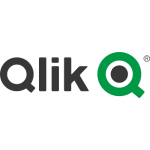About Microsoft Azure SQL Database
Microsoft Azure is a public cloud computing service designed for building, testing, launching, and managing applications and services via Microsoft-managed data centers. Through its platform-as-a-service (PaaS), software-as-a-service (SaaS), and infrastructure-as-a-service (Iaas) offerings, Microsoft Azure integrates with a wide range of programming languages and tools. In addition to working with Microsoft's proprietary software and systems, Azure is compatible with third-party solutions, including Linux. As an extremely popular cloud services platform, many businesses and enterprises have used Microsoft Azure to migrate their computer systems to the cloud and eliminate the costs and staff requirements needed to maintain physical onsite servers.
About QlikView
As a flexible business intelligence solution, QlikView services over 24,000 organizations around the world. The platform includes easy-to-use BI tools that facilitate the consolidation, searching, and visual analysis of your data for deeper business insights and better decision-making. Perhaps the most popular part of QlikView is the fact that it takes only minutes to learn how to use this highly intuitive platform, which offers an endless variety of querying capabilities without you needing to apply strictly defined structures to your data. Plus, QlikView is neatly packaged in a clean and simple user interface.
Microsoft Azure SQL Database's End Points
Microsoft Azure Virtual Machines
As one of its IaaS features, Microsoft Azure allows users to deploy virtual machines developed in Windows or Linux.
Microsoft Azure App Services
As one of its PaaS features, Azure App Services allows you to publish and manage websites and web applications.
Microsoft Azure WebApps
WebApps is Microsoft Azure's high-density web hosting service, which allows you to build web applications more efficiently with PHP, Node.Js, or Python, then deploy them on the Azure Cloud.
Microsoft Azure WebJobs
WebJobs gives you the ability to launch applications in the Microsoft App Services space and host them in the cloud.
Microsoft Azure Mobile Engagement Services
Microsoft Azure's mobile engagement service provides real-time tracking, data analytics, and deep insights to better understand user engagement and behavior for your mobile applications.
Microsoft Azure HockeyApp
Microsoft Azure's HockeyApp is a productivity-enhancing driver that helps you design, build, beta test, and distribute mobile apps more efficiently.
Microsoft Azure REST and SDK APIs
Azure's REST and SDK APIs allow you to store and access your application data on Azure's cloud platform.
Microsoft Azure Table Services
Azure Table Services facilitates the storage of data in structured text form so you can access it via a partition and primary key.
Microsoft Azure Blob Service
Blob Service empowers you to store unstructured text information and binary data as 'Blobs' accessible through HTTPS.
Microsoft Azure Queue Service
Queue Service streamlines asynchronous communication across multiple programs.
Microsoft Azure File Service
Azure File Service facilitates cloud data storage via REST API and the SMB Protocol.
Microsoft Azure Search Functionality
Azure's data search functionality supports more efficient data searching with REST and SDK APIs.
Microsoft Azure SQL Data Warehouse
Azure's SQL data warehouse is managed by Microsoft within the Azure Cloud Facility. It offers high-performance querying and enhanced data security.
Microsoft Azure Messaging Service
Azure Service Bus is a messaging service that facilitates communication between the Azure Cloud and applications operating on-site and off-site to build more reliable and scalable applications. The Azure Service Bus supports communication via Event Hubs, Queues, Topics, and Relays.
Microsoft Azure Automation Features
Azure Automation allows users to automate frequently-repeated tasks that they perform in their cloud and enterprise environments to save time and prevent human errors. Automation improves the reliability of common administrative tasks. Azure automation allows you to schedule tasks with runbooks or use Desired State Configuration for the automation of configuration management tasks.
QlikView's End Points
QlikView Qlik Sense Data Analytics Platform
QlikView prides itself on being an 'agent of transformation' for businesses and organizations via the 'Qlik Sense' associative data analytics engine and artificial intelligence technologies. Moreover, the solution's multi-cloud architecture gives you the freedom to deploy whatever combination of on-premises, private cloud, or SaaS you want. Scale to the parameters you require with open APIs, data integration features, and flexible governance. QlikView empowers all team members — regardless of their technical skill levels — to participate in making better, data-driven decisions.
QlikView Data Integration
QlikView acquired Attunity to bring enterprise-level data integration and real-time analytics to its customers via a 'DataOps' approach to data integration. The platform automates data streaming, refinement, cataloging, and publishing to offers real-time data that's ready for analytics.
QlikView Embedded Analytics
QlikView's embedded analytics features allow you to seamlessly embed your QlikView analytics content and interactive dashboards within products, websites, portals, and applications. This empowers users and customers to access important information, metrics, and insights without needing to switch to a separate platform.
QlikView Developer Platforms
QlikView's developer platforms provide the tools your developers need to build, extend, and launch customized, data-driven apps and analytics. The solution offers native, cloud analytics development through the Qlik Core platform — which features an associative engine and open source libraries. This empowers developers to create interactive applications that you can deliver at any scale in any cloud-based architecture.








